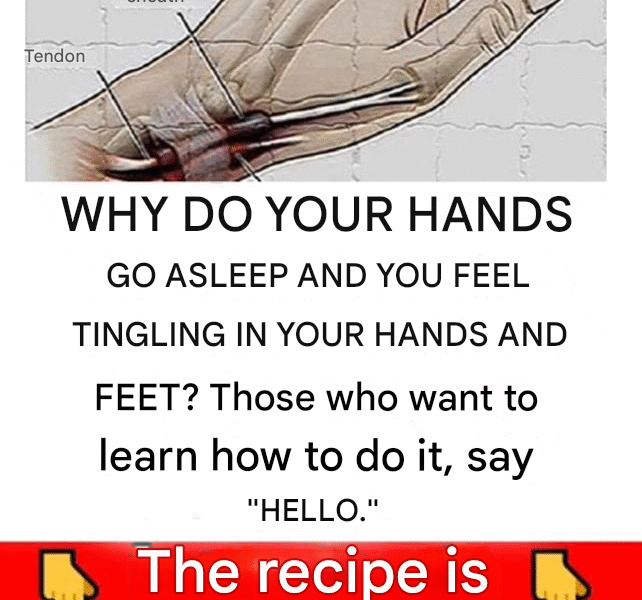You Know Why Your Hands Go Numb and Your Feet Tingle? Here’s What’s Really Happening!
Have you ever experienced that strange sensation where your hands suddenly go numb or your feet begin to tingle for no apparent reason? It’s something we’ve all felt at some point—maybe when you’ve been sitting or sleeping in one position for too long, or after a long day of standing. But what is the cause behind these sensations, and is it something to worry about?
The feeling of numbness, tingling, or even pins and needles is often more common than you might think, and it can be linked to various factors. Understanding the reasons behind these sensations can not only help you recognize when it’s a normal occurrence but also when it might signal something more serious.
Let’s break down the science behind numbness and tingling in your hands and feet, and when you should consider seeing a healthcare professional.
What Causes Numbness and Tingling?
The sensation of numbness or tingling in the hands or feet is generally due to something affecting the nerves. Our nerves are responsible for sending signals from the body to the brain and vice versa, so when they’re compressed or damaged, they can send mixed signals, which can result in the sensations of tingling or numbness.
There are several common causes for this:
1. Pressure on the Nerves
This is perhaps the most common cause. It can happen if you’ve been sitting or sleeping in one position for too long, causing pressure on certain nerves. When this happens, the nerves temporarily stop functioning properly, resulting in the sensation we call pins and needles. The good news is that this type of numbness usually disappears as soon as you change positions and relieve the pressure.
2. Poor Circulation
Sometimes, poor circulation can cause tingling or numbness in your extremities. This can happen when blood flow to certain parts of the body is restricted due to factors such as sitting for long periods, a poor diet, or certain medical conditions like diabetes or high blood pressure.
3. Carpal Tunnel Syndrome
If you experience tingling, numbness, or weakness in your hands, especially at night, you might be dealing with carpal tunnel syndrome. This condition occurs when the median nerve, which runs through the wrist, becomes compressed. It’s often caused by repetitive motions such as typing or using a computer mouse.
4. Nerve Damage (Neuropathy)
Sometimes, tingling or numbness can be a sign of nerve damage or neuropathy, particularly if the sensation is persistent and not linked to temporary pressure. This can occur as a result of conditions like diabetes, multiple sclerosis, or even alcohol abuse.
5. Vitamin Deficiency
Deficiencies in certain vitamins, particularly B12, can also lead to numbness or tingling. This is because B12 plays a crucial role in nerve health and function. A deficiency can lead to nerve damage and the sensations you’re experiencing.
6. Injury or Trauma
A direct injury to the nerves or spinal cord can also cause tingling or numbness. Spinal disc issues, such as herniated discs, can lead to pressure on nerves that travel to the hands and feet, causing these symptoms.
7. Underlying Health Conditions
Certain health conditions, like stroke, seizures, or autoimmune disorders, can cause numbness and tingling in the body, particularly if the brain or nervous system is affected. These conditions may cause more severe symptoms that require medical attention.
When Should You Be Concerned?
While occasional numbness or tingling is usually nothing to worry about, there are times when it may indicate a more serious underlying issue. You should consult a healthcare professional if:
- The sensation lasts for more than a few minutes.
- You experience tingling or numbness alongside other symptoms like weakness, vision problems, difficulty speaking, or loss of coordination.
- The sensation is chronic and occurs regularly.
- You have an underlying health condition like diabetes or high blood pressure, which can worsen nerve health.
- The numbness or tingling starts to affect your daily activities or work.
How Can You Prevent or Relieve Numbness and Tingling?
If you’re experiencing occasional numbness or tingling, there are several simple steps you can take to alleviate or prevent it:
- Change Positions Regularly – Avoid sitting or standing in one position for too long. Move around, stretch, and change your posture frequently.
- Maintain Good Circulation – Keep your blood flowing by staying active and engaging in regular exercise.
- Improve Your Diet – Ensure you’re eating a balanced diet rich in essential vitamins, including B12, and other nutrients vital for nerve health.
- Manage Underlying Conditions – If you have health conditions like diabetes, make sure they’re well-managed with medication and lifestyle changes.
If you found this article helpful and informative, don’t forget to LIKE, SHARE, and FOLLOW for more health tips and advice. Share the knowledge with your friends and family so they can benefit too! 🌟
